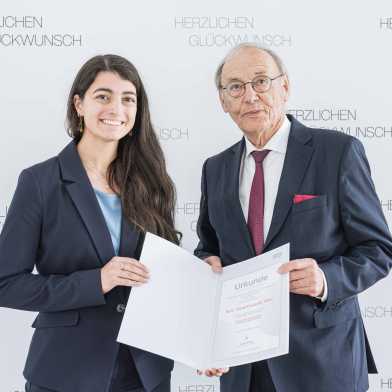News
RobotX Innovation Day: How robots learn to see, understand and decide

On Friday, 4 July 2025, the former machine hall on ETH Zurich's Campus Zentrum opened its doors for the RobotX Innovation Day. This annual event brought together researchers, entrepreneurs, and robotics enthusiasts to explore the current state of robotics research.
The Jörg G. Bucherer-Foundation donates 100 million Swiss francs to ETH Zurich for Earth observation centre

ETH Zurich will receive 10 million Swiss francs a year from the Jörg G. Bucherer-Foundation for the next ten years. The university will use the funds to establish a competence centre for Earth observation with global appeal and a physical presence in the Canton of Lucerne. The Canton of Lucerne is to support the project as infrastructure partner.
"ETH Swiss GeoLab will put us among the world's leaders in Earth observation"

The Jörg G. Bucherer-Foundation's donation of 100 million Swiss francs will enable ETH Zurich to establish a new competence centre for Earth observation. ETH President Joël Mesot explains how the partnership came about and how it will benefit ETH Swiss GeoLab.
Intelligent wound dressing controls inflammation

Chronic wounds are a major medical challenge, burdening healthcare systems with billions of dollars in costs every year. Pioneer Fellow Börte Emiroglu is developing a new product: a selective, sponge-like hydrogel that reduces inflammatory signals and actively promotes healing.
Does densification lead to more heat stress in cities?

High temperatures and more frequent heatwaves are causing many people to doubt whether high-density urban planning is still sustainable. However, building physicist Jan Carmeliet argues that even dense cities can be cool if they are planned correctly.
From virtual worlds to medical applications: microrobots learn to autonomously navigate blood vessels

Imagine a microrobot navigating the vessels of the human brain by learning from its own “dreams”. Researchers led by Daniel Ahmed, Professor of Acoustic Robotics for Life Sciences and Healthcare at ETH Zurich’s Department of Mechanical and Process Engineering (D-MAVT), have developed a new method that enables microrobots to learn autonomous navigation through simulation.
ETH spin-offs sweep the board at Venture Awards

Six spin-offs of ETH Zurich were among the 18 finalists in this year’s Venture Awards. Three of them won in their respective categories, and three came in second. The Grand Prize went to spin-off MyNerva.
Using smartphones to combat river waste: SARA project receives funding from the D-MAVT sustainability fund

The SARA project receives CHF 5,000 in funding from the Sustainability Fund of the Department of Mechanical and Process Engineering (D-MAVT) at ETH Zurich. It is part of the student initiative Autonomous River Cleanup (ARC) from the Robotic Systems Lab, which aims to remove waste from rivers.
A building material that lives and stores carbon

Researchers are developing a living material that actively extracts carbon dioxide from the atmosphere. Photosynthetic cyanobacteria grow inside it, forming biomass and solid minerals and thus binding CO2 in two different manners.
Master's graduation ceremony 2025: D-MAVT honors its graduates

On 12 June 2025, the Department of Mechanical and Process Engineering (D-MAVT) held its Master's ceremony in the historic main building of ETH Zurich. Over 400 graduates celebrated the successful completion of their Master's degree together with their families.
On equal terms with the CTO

Students at ETH Zurich are teaming up with engineers from industrial companies to help expedite innovation. This unique approach to teaching and collaboration has been hailed by both sides as a great success.
“It’s about finding the courage to take the first step”

Alumna Petra Ehmann studied Mechanical Engineering at ETH Zurich. Today, she works for the Ringier media group as Chief Innovation and AI Officer. Her technical understanding helps her to act as a bridge builder between engineers, senior management and the market.
ETH Medal and Willi Studer Prize 2025

As part of this year’s Master's graduation ceremony on 12 June 2025, the Department of Mechanical and Process Engineering (D-MAVT) honored the achievements of its graduates. Fourteen graduates were awarded the ETH Medal for their outstanding Master's theses, and five received the Willi Studer Prize for achieving the highest final grade.
Practising medicine on a lifelike silicone model

An ETH spin-off, Swiss Vascular, has developed anatomically exact silicone models of cerebral vessels. Through this development, researchers will not only reduce the amount of animal experimentation required but also improve the standard of medical training for complex medical procedures.
André Bardow member of the new ETH Sustainability Council

André Bardow, Professor of Energy and Process Engineering at the Department of Mechanical and Process Engineering (D-MAVT), has been elected by the Executive Board of ETH Zurich as a member of the newly established Sustainability Council.
Sanitary towels morph into test strips

Researchers at ETH Zurich have developed the first technology that is able to recognise biomarkers in menstrual blood – directly in sanitary towels. MenstruAI promises a simple, non-invasive method for recording health data in everyday life.
Elena Totter receives Student Award from the SEW-EURODRIVE Foundation

Elena Totter, a Master's graduate in Mechanical Engineering from the Department of Mechanical and Process Engineering (D-MAVT) at ETH Zurich, has received the SEW-EURODRIVE Foundation Student Award for her Master's thesis.
Six professors appointed

At the meeting on 21st and 22nd May 2025, the ETH Board appointed two female and four male professors at the request of ETH President Joël Mesot. The Board also awarded the title of "Professor" three times and the title of "Professor of Practice" twice.
Where power will come from in 2050

By 2050, the aim is for Switzerland’s energy system to be decarbonised and no longer reliant on nuclear power. How this can be achieved and the costs of doing so are set out in a new report by a Swiss research consortium involving researchers from ETH Zurich, the universities of Geneva and Bern, EPFL, WSL, and ZHAW.
Robots that can climb trees or restore coral reefs

Around 100 Bachelor’s students from the Department of Mechanical and Process Engineering have spent two semesters working on their Focus projects in 11 teams. They will present the results of their projects on 28 May.